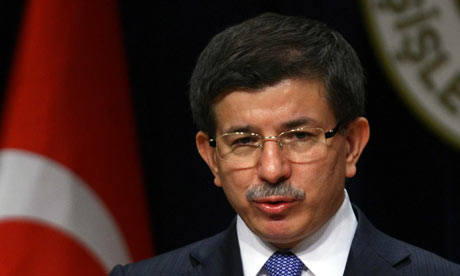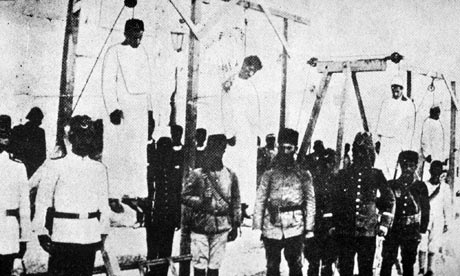Definitions of genocide are difficult but one thing is clear: the US Congress has no business ruling on the Armenian claim
Marcel Berlins
So the foreign affairs committee of the US House of Representatives has passed a resolution (by 23 votes to 22) that the Turkish killings of Armenians in 1915 amounted to genocide. What business is it of theirs? I’m not judging whether their decision was right; I don’t know enough to do that. My concern is that such ham-fisted intervention, and the publicity it received, demeans a crime which should be treated as the worst in the annals of human behaviour, and turns it into a political event played out by largely ignorant legislators responding to a campaign by a well-funded political lobby.
Thankfully, their presumptuous decision will not find its way into the statute book. President Obama doesn’t want it to, just as an identical decision by the House of Representatives in 2007 did not become law because President Bush didn’t find it politically expedient.
The word genocide and its original definition were crafted by Raphael Lemkin, a Polish lawyer, in 1944. In 1948 the UN adopted the convention for the prevention and punishment of the crime of genocide, which defines it as “acts committed with the intent to destroy, in whole or in part, a national, ethnical, racial or religious group”. (The defendants in the main Nuremberg trials in 1946 were not charged with genocide as such but a statement outlining their alleged war crimes accuses them of “deliberate systematic genocide – viz, the extermination of racial and national groups – against the civilian populations of certain occupied territories, in order to destroy particular races and classes of people, and national, racial or religious groups, particularly Jews, Poles, Gypsies and others”.)
The 1948 UN definition has come under critical scrutiny (for instance, can you intend to destroy “in part”?) with many experts offering different versions. But the gist remains the same.
Recent atrocities in Darfur have added further confusion. Last month an appeal committee of the international criminal court (ICC) in the Hague recommended the court consider indicting Sudan’s president, Omar Al-Bashir, on a charge of genocide; this overturned a previous ruling by another arm of the ICC.
It seems to me, following the generally agreed ingredients of most definitions, there were two clear cases of genocide last century – the Holocaust and the Rwandan massacre. Whether or not the Ottoman empire in 1915 was guilty is more open to debate. It’s not a question of the numbers who died, or in what appalling circumstances. What matters is the intention to exterminate, and a systematic attempt to do so. I am equally uncertain about Darfur and Srebrenica. There are many words for the horrifying conduct of some leaders and their troops, but genocide may not be one of them.
What I am sure of is the decision to use that solemn word should be a matter for courts, helped by witnesses and historians, and not for politicians of dubious moral authority.
https://www.theguardian.com/uk/2010/mar/08/marcel-berlins-us-genocide-ruling, 8 March 2010
===============================
Marcel Berlins (born 1941)[1] is a lawyer,[2] legal commentator, broadcaster, and columnist. He writes for British newspapers The Guardian and The Times, and presented BBC Radio 4’s legal programme Law in Action for 15 years.[3]
He was born in Marseille,[4] France, but moved with his parents to South Africa as a teenager and stayed there till early adulthood.[5] He remains a French citizen, and voted in the 2007 French presidential election.[6]
Berlins writes a weekly column for The Guardian, and regularly reviews crime fiction for The Times.[2] Berlins began presenting BBC Radio 4’s legal affairs programme Law in Action in 1988, and won two Legal Broadcaster of the Year awards before retiring from the programme in 2004.[3] He is a contestant in the 2009 series of Radio 4’s Round Britain Quiz.[7] He is also a visiting professor in media law at City University, London.[8]
[edit] Bibliography
- 1979 – Ramesh Maharaj, barrister behind bars
- 1982 – Living Together (with Clare Dyer)
- 1986 – The Law Machine (with Clare Dyer) – the last edition was published in 2004
[edit] References
- ^
 This article incorporates public domain material from websites or documents of the Library of Congress (retrieved on 15 September 2009).
This article incorporates public domain material from websites or documents of the Library of Congress (retrieved on 15 September 2009). - ^ a b Marcel Berlins biography, The Guardian
- ^ a b About Law in Action, BBC website, retrieved 26 August 2009
- ^ Marcel Berlins (2006-08-30). “”Ségolène Royal is the left’s best bet to be the next leader of France. But the socialist elephants are out to stop her””. The Guardian. . Retrieved 2008-04-25.
- ^ Marcel Berlins (2005-12-14). “”I lived in a South Africa ruled by apartheid. Now I return to find that freedom has plunged the country into the real, hard world””. The Guardian. https://www.theguardian.com/world/2005/dec/14/southafrica.comment. Retrieved 2008-04-25.
- ^ Marcel Berlins (2007-04-25). “”Yes, I backed the wrong horse in the French election, but at least I had some fun voting””. The Guardian. https://www.theguardian.com/commentisfree/2007/apr/25/comment.france. Retrieved 2008-04-25.
- ^ Round Britain Quiz website: “meet the teams”
- ^ Marcel Berlins City University London website
[edit] External links
- Marcel Berlins’ Guardian columns at Comment is free
- “Marcel Berlins introduces The 50 Greatest Crime Writers list”, The Times, April 17, 2008
- “Marcel Berlins reviews the latest crime fiction “, The Times, July 4, 2009



 Foreign minister Ahmet Davutoglu says describing the 1915 Armenian killings as genocide is an insult to Turkey’s ‘honour’. Photograph: Adem Altan/AFP/Getty Images
Foreign minister Ahmet Davutoglu says describing the 1915 Armenian killings as genocide is an insult to Turkey’s ‘honour’. Photograph: Adem Altan/AFP/Getty Images




